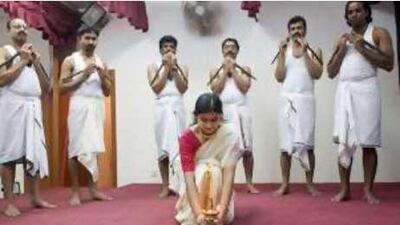ABU DHABI // An ancient Indian dance performed at the temples in Kerala is being kept alive by a man determined to help the capital's residents to reconnect with their culture while working abroad. VTV Damodaran, who learnt kolkali with his father as a youngster but gave it up when he went to college, decided to take up the art again when he moved to Abu Dhabi more than a decade ago.
However, he said it had been so long since he had practised the dance that he had to ask his father for advice before he felt he was confident enough to train people. "I couldn't do whatever I liked," he said. "I had to clarify specific steps." Kolkali is a dance performed by men, who move in a circle, creating a rhythm through special feet movements, while striking each other's wooden sticks. Most performances last up to three hours and a singer gradually increases the momentum until the song reaches its climax.
"The rhythm should be in line with the sticks, otherwise it makes an ugly noise," said Mr Damodaran, who in 2006 became the only non-resident Indian to be honoured for his work by the Folklore Academy in Kunnoor. The dance, which began as an evening performance in villages in ancient times, developed into a temple dance and a focus of social gatherings during festivals. The kolkali movements, based on an ancient martial art known as Kalaripayattu, help to keep people fit. Mr Damodaran says the dance is especially good for the abdomen and legs.
Kolkali is supposed to be practised outside or in a temple. However, the summer temperatures in the UAE mean outdoor dancing is not an option. "Here we can't get a proper place to practise," said Mr Damodaran. "The hindrance is we cannot go to open-air places, plus people work so late." Despite this, he has trained more than a dozen of the 170-strong alumni of the Sri Narayana College of Kerala. Devadas Poduval, one of his students, said: "If the parents are interested, they will encourage the children to go for it. My parents didn't, but for me, it was driven by self-interest. I saw people doing it and I got that."
Kolkali is usually taught to Indian children between the ages of six and 14. The minimum number required for the formation of the circle is eight, but there is no limit as to how big it can grow. One of the largest gatherings Mr Damodaran has supervised was of 102 children in his home town of Payyanur in Kerala, during the inauguration of a cultural club. Traditionally, the dance has been dominated by boys or men, although girls are now also being trained. Mr Damodaran hopes to teach children, but says that these days they are more interested in martial arts, such as karate.
Mr Poduval agrees: "I have three daughters. All my children have been educated in Abu Dhabi and there was no chance to learn. My sister and brothers are based in Kerala and they all learnt it and are masters in it." Mr Damodaran has written a kolkali song as a tribute to Sheikh Zayed and his achievements. It was acceptable to modify the traditional songs, he said, as the message was really about mankind and brotherhood.
The group's next performance is scheduled to take place in the new Indian Social Centre when it opens in the capital later this year. @Email:sbhattacharya@thenational.ae To see more pictures of this ancient Indian dance, go to www.thenational.ae/photos/kolkali

